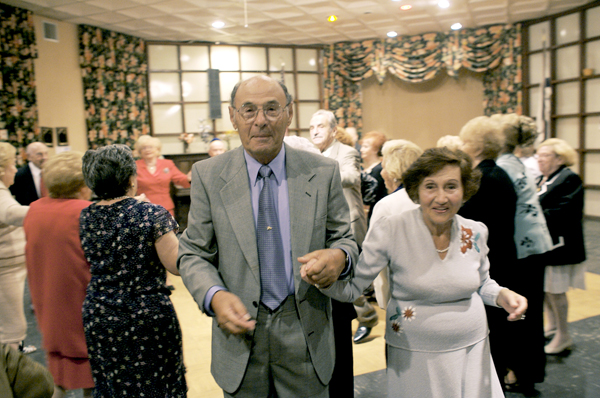|
Reviews of Recent Independent, Foreign, & Documentary Films in Theaters and DVD/Home Video

FOUR SEASONS LODGE Four Seasons Lodge is a quietly revealing tribute to unique octogenarians—Holocaust survivors who have summered together for 25 years and the cinema vérité pioneer Albert Maysles. Director Andrew Jacobs was at the end of his 2005 summer assignment covering the Catskills for The New York Times when he found the Four Seasons Lodge bungalow colony—Eastern European immigrants bereft of family who annually join together to share their zest for living. Hearing that the following summer could be the last for the lodge, he was galvanized to document their community, and convinced Maysles to lead a team that filmed more than 250 hours of footage. Maysles’s presence helped the much younger filmmakers gain the lodgers’ trust. Their Holocaust experiences are only brought up in passing, and aren’t elicited until halfway through the film. Maysles’s style yields gems of captured moments, revealing why the guests bonded together to found the resort and why they stayed together at the one place they can relax and be themselves. A casually searing shot picks up a table full of lodgers playing cards, all with numbers tattooed on their arms. Women’s gossip about their marriages is summed up by one saying among the survivors, “Hitler was the matchmaker.” Each emphasizes that they survived because they were plucky adolescents. However, one man refuses his wife’s urgings to reminisce, and a woman insists she will resist her granddaughter’s importuning to tell her story until just before her death, and maybe not even then. What comes across strongly is how these friendships replaced their lost families. Two women who were married to cousins have been summer roommates for so long that they seem like a married couple. Mostly the film gently follows the rhythm of the seasons and the week. After a week of schmoozing in the shade, Friday nights quietly start with a lovely montage of the women lighting Sabbath candles and saying the blessings, even as that brings forth memories of their murdered mothers. The Sabbath ends with the men donning yarmulkes and raising their voices in prayer around a havdalah candle. In between they repeat what are probably regular arguments of whether they can still believe in God. They also eerily echo the famous Monty Python routine of who grew up in worse conditions, but here it is based on who suffered the most, until one man trumps them, reminding them that he was a favorite for Dr. Mengele’s experiments, which abruptly ends that discussion. With religion out of the way, they party down in the best Catskills tradition of a gala Saturday night dinner and dancing to bands who have only barely updated their routines in decades. All come formally dressed, and it is a sad sign of a serious, and probably final, illness when a lodger can’t make it to the dance floor. (There is a memorial listing at the end of who has died since filming.) However, there are only vague references to how they came to the United States and found each other after the war, with only a smattering of home movies and photographs. Their careers are only briefly mentioned, just enough to get across that they are working-class folks, one a mechanic who worked on Hitler’s car. Surprisingly, no one shows off photos of children and grandchildren. The cranky caretaker’s son comes to visit, but his lack of commitment to helping the colony continue on is the only hint from the younger generation that these strong emotional connections are not continuing into the next generation. Jacobs
prefers to see the lodgers mostly in the present as they organize to
keep the colony going, looking at them with a less anthropological eye
than
Lynne Littman‘s
1976 film Number Our Days did towards Jewish seniors. They
certainly don’t seem like exotic strangers to me. I have fond memories
of summers at an upstate bungalow colony with families who became my
parents’ lifelong friends and of neighbors who all speak of similar
experiences. Four Seasons Lodge preserves for others and for
posterity some of what they have shared with me—soon
there will be none left to bear witness to how to endure and prevail
despite man’s inhumanity to man.
Nora Lee Mandel
|

